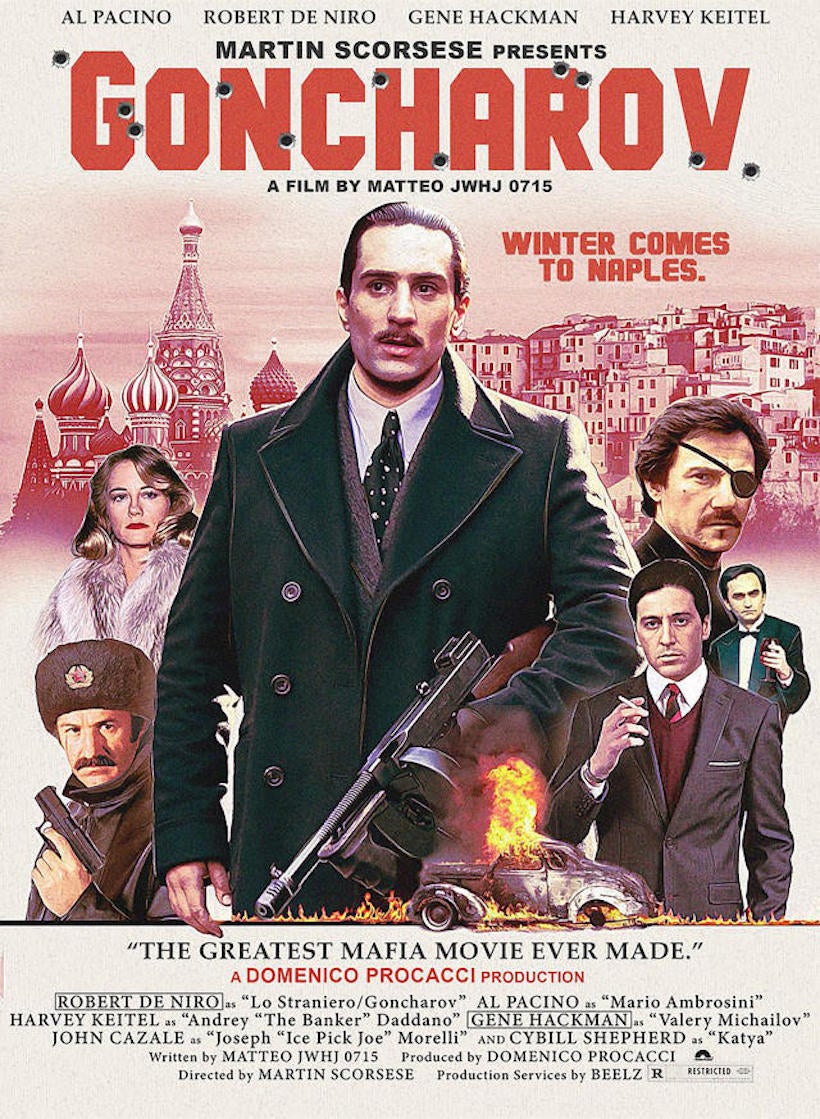The Neapolitan mafia epic “Goncharov” (1973) by Martin Scorsese has been trending all over social media. Fans have been applauding the film’s deep thematic elements, compelling characters and iconic cinematography. Except there is one problem: the film doesn’t exist.
Goncharov (1973) is a piece of collective fiction, and in-joke that began on Tumblr. Netizens have committed to the bit of pretending the film is real, a phenomenon that trickled over to Reddit and Twitter. Now the film has a variety of posters and a soundtrack, alongside fan content including memes, reviews, fanfiction, fanart, and a TV Tropes page.
The dynamics surrounding this fake film mimic how fans interact with mainstream media. It is frequent in fan spaces to interact with a film, TV show or book via secondary sources. Audiences may learn about a piece of media through a review, a gif-set, a piece of fan art or an enthusiastic fan raving about it in their posts. This is how the world of Goncharov has been constructed. Its mythos is being built through secondary sources that imply the existence of the film. This leaves some unsure whether the film is actually real.
That is the game: pretending that Scorsese’s Goncharov actually came out in 1973. Collaborators are engaging in make belief that mirrors fan culture dynamics. For some, explaining that it’s not real breaks the illusion and ruins the joke.
Nicolle Lamerichs has seen this kind of communal creation before. As senior lecturer with a PhD in media studies, she has been logging the Goncharov phenomenon. For her book Productive Fandom she studied the Sherlock fandom. Lamerichs traces this type of pretend back to Arthur Conan Doyle’s novels. “There’s a long history of pretending Sherlock Holmes and Watson are real. The Great Game, we call that.” Fans participated in the game, passing off additional content as traces of Holmes and Watson’s adventures they had discovered. Fandom of contemporary adaptations of the books continued this tradition.
This sort of behaviour lends a sense of materiality to the content created. Fanart buys into Goncharov’s universe by pretending it is real. Its creation parodies how we consume and interact with today’s media landscape.
When fans create art in ‘homage’ of Goncharov, they are also creating an element of the film itself. In sharing their art of a scene or character, netizens canonise their existence. The publication of beelzeebub’s poster rekindled Tumblr’s love affair with Goncharov and established a cast. Robert De Niro now played the titular character. Other roles were named and their actor faceclaims established.
Goncharov also imitates how we create fiction. Alex Kingsley, a game designer and comedian on TikTok, believes that the “democratisation of technology and entertainment” allows fiction like this to flourish. They explain that the trend is “not that different from how we create fiction in general. [In a real movie], people just decide this is the story, and we agree to believe it. But unlike a regular movie, or book, or any existing piece of media or fiction, there’s no sense of authorship because everyone is agreeing that this is a Martin Scorsese film.”
When “Gonchposting”, social media users are participating in online storytelling. Lamerichs says we can look to Alternate Reality Games (ARG) to understand how enjoyable fans find engaging with a story. Often supplemental to a film or game, they use elements of the real world as a platform to tell a story, creating an “alternate reality” in our day-to-day world. Players do not want to see behind the curtain, but instead interact indirectly with characters through puzzles, websites and physical objects.
Cecelia, TikTok user and Tumblr veteran, highlighted the trend’s community spirit and kindness. To her it was emblematic of the sites “yes, and…” culture where users build on and riff off others’ jokes. She highlighted Goncharov’s deviation from Tumblr’s usual spirit in regard to in-jokes. The site tends to leave people behind if they miss the joke: “If you didn’t catch it, or can’t catch up, […]. You either have to roll with it until you can collect enough data to figure it out. Or you’re just not there”. The Goncharov bit is “all about the discussion” and so was “never meant to be contained”, becoming funnier the more it was shared.
Lamerichs believes Goncharov is here for the long haul. “I’m not saying for years. It might die down a bit. But I think it’s something people are now so invested in, in making this mythos real, that it’s going to stay a little”.








